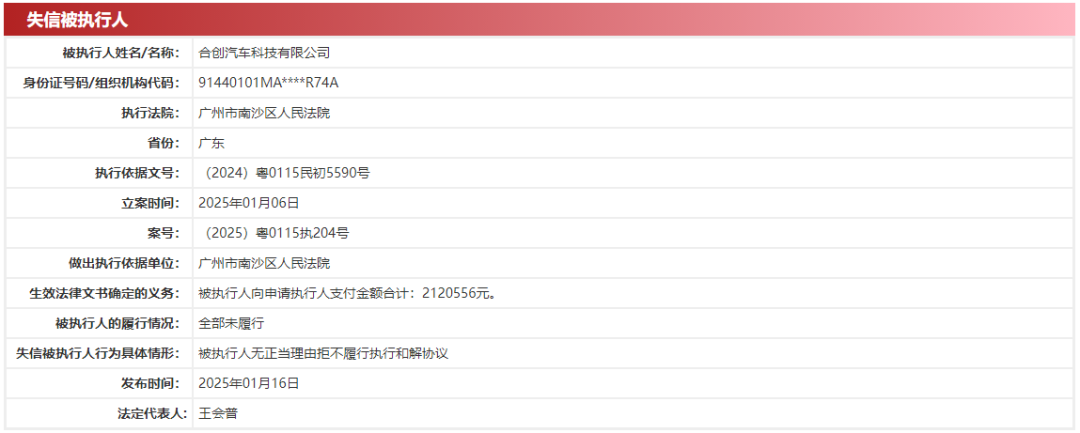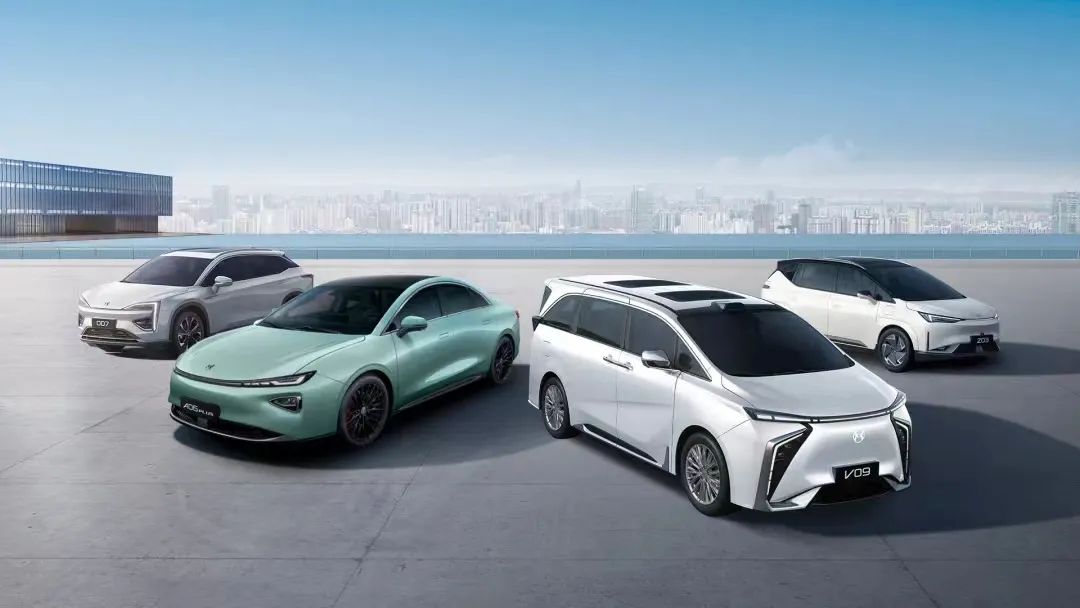Collapse of Auto Industry Newcomer After Burning Through RMB 3 Billion
![]() 02/07 2025
02/07 2025
![]() 667
667
The automotive industry's reshuffle is just beginning in 2025.
After burning through RMB 3 billion and selling just 40,000 vehicles, Hozon Auto has become the first new automotive force to collapse in 2025.

Image source: China's Executive Information Disclosure Network
According to China's Executive Information Disclosure Network, on January 16, Hozon Automobile Technology Co., Ltd. was listed as a dishonest person subject to enforcement by the Nansha District People's Court of Guangzhou City for refusing to execute a settlement agreement without justification, involving a service contract dispute case where the obligations were completely unfulfilled. The effective legal document stipulates that the person subject to enforcement must pay a total of RMB 2,120,556 to the applicant for execution.
Prior to this, GAC Group issued an announcement stating that the company had deliberated and approved the "Proposal on Providing Loans to Shareholding Companies According to Shareholding Ratio." Under this proposal, shareholder loans specifically for paying employee salaries and economic compensation were agreed upon, with the company and its holding subsidiary GAC AION providing approximately RMB 23.8 million in combined loans (subject to actual incurred amounts), accounting for 25% of the total shareholding.
Additionally, it was agreed that in accordance with relevant laws and regulations, GAC AION would be entrusted to handle the after-sales service for Hozon Auto products. Based on a 10-year after-sales service period, it was estimated that Hozon Auto shareholders would provide loans not exceeding RMB 174 million, proportional to their shareholding, specifically for the after-sales service of Hozon Auto products.
The "first thunderbolt" of the new forces in 2025?
The collapse of Hozon Auto had early warning signs.
Since January 2024, there have been successive reports of severe operational difficulties and unpaid employee salaries at Hozon Auto. Some media outlets revealed that Hozon Auto laid off employees in July 2024, leaving only over 50 people at its Guangzhou headquarters to maintain basic operations. The company was notably absent from the Guangzhou Auto Show in November.
The clock winds back to December 28, 2017, when GAC Group announced a cooperation with Shanghai NIO Automobile Co., Ltd. to jointly establish GAC NIO, with a planned total investment of RMB 1.28 billion. GAC Group accounted for 45%, while NIO accounted for 55%. This venture was the precursor to Hozon Auto. The partnership between GAC and NIO was seen as a union between a traditional automaker and a new automotive force, with promising development prospects.
In 2020, GAC NIO launched its first automotive product, the Hozon 007, an electric SUV with a range of about 500 kilometers and a top speed of 170 kilometers per hour, priced at RMB 259,800. Despite being backed by a major automaker, the Hozon 007 did not gain much traction in the fiercely competitive market, selling only 508 vehicles in its launch year.
Subsequently, NIO expressed its intention to withdraw. In January 2021, GAC NIO implemented a capital increase and share expansion plan by introducing strategic investors, raising a total of approximately RMB 2.405 billion. Among them, GAC AION increased its capital by approximately RMB 482 million, while Guangdong Zhutou Intelligent Technology Investment Co., Ltd. (hereinafter referred to as Zhutou Intelligent) increased its capital by approximately RMB 1.923 billion as a strategic investor, becoming GAC NIO's largest shareholder. Subsequently, some senior executives from GAC and NIO successively stepped down from the board. In May 2021, GAC NIO officially changed its name to Hozon Auto, with Li Zhihong, President of Zhujiang Investment Management Group, succeeding as the legal representative.

Image source: Hozon Auto
Public data shows that Hozon Auto has undergone three rounds of financing, two of which are publicly available, totaling RMB 3.005 billion. Investors include GAC Group, GAC AION, Zhutou Intelligent, among others.
In terms of products, after NIO's withdrawal, Hozon Auto successively launched the commercial vehicle Hozon V09, the sedan Hozon A06, and the compact SUV Hozon Z03, further diversifying its product line. However, sales remained sluggish.
Data indicates that in 2022 and 2023, Hozon Auto's annual sales were 18,600 and 18,900 vehicles, respectively. According to the production and sales bulletin issued by GAC Group, in 2024, Hozon Auto's sales were less than 4,950 vehicles, a year-on-year decrease of up to 82.32%. Notably, Geely Auto, which surged at the end of 2024, delivered 13,561 vehicles that year, meaning Hozon Auto's sales were less than half of Geely Auto's.
GAC Group's announcement reveals that in 2023, Hozon Auto's revenue was RMB 2.44 billion, with a total loss of RMB 1.84 billion. As of November 30, 2024, Hozon Auto's revenue was RMB 617 million, with a total loss of RMB 1.13 billion. In the fiercely competitive auto market, Hozon Auto's continuous losses rendered it unsustainable.
GAC pledges to cover debts
Similar to how Baidu and Geely covered debts for the collapsed Geely Auto, as a shareholder, GAC has pledged to cover debts for Hozon Auto.
However, GAC Group currently faces significant development pressure. Data shows that in 2024, GAC Group's total sales were 2.0031 million vehicles, a year-on-year decrease of 20.04%; its cumulative sales of new energy vehicles were 454,700, a year-on-year decrease of 17.26%. Among them, GAC AION's annual sales were approximately 374,900 vehicles, a year-on-year decrease of 21.90%.
GAC Group's 2024 performance forecast predicts a net profit attributable to the owners of the parent company ranging from RMB 800 million to RMB 1.2 billion, a year-on-year decrease of 72.91% to 81.94%. After deducting non-recurring gains and losses, the net profit attributable to the owners of the parent company is expected to range from -RMB 4.7 billion to RMB 3.3 billion, a year-on-year decrease of 192.37% to 231.56%.
This marks the first time GAC Group has incurred an annual loss since listing on the A-share market in 2012.
Regarding the sharp drop in net profit, GAC Group stated that factors such as the price war in the auto industry and drastic changes in the competitive landscape have led to decreased auto sales. Simultaneously, in response to market competition, the company and its invested enterprises have increased investment in business policies such as sales subsidies by approximately RMB 18 billion.
On the Shanghai Stock Exchange's e-interaction platform, GAC Group replied to investors that the company has formulated a three-year "Panyu Action" plan, aiming to challenge its independent brands to reach sales of 2 million vehicles by 2027. Over the next three years, the company will launch 22 new models (independent brands), covering mainstream new energy power forms such as pure electric, extended range, and plug-in hybrid, by reshaping the characteristics of its independent brands. It will adhere to independent R&D investment to ensure product competitiveness and accelerate the expansion of international markets through specific measures.
The collapse of Hozon Auto once again sounds the alarm for the "car manufacturing frenzy" that has swept the industry. In recent years, cross-border car manufacturing has attracted capital from various fields. Car manufacturing is a capital-intensive game, and even once-wealthy real estate giants have yet to emerge victorious in this race. In fact, besides abundant funds, the auto industry has high technical thresholds, long industrial chains, and fierce market competition. Every aspect, from product research and development, production and manufacturing, to brand building and marketing, requires meticulous refinement and long-term accumulation. Even with everything in place, there is still uncertainty about whether the final product will win consumer recognition.
Hozon Auto will not be the last automotive company to collapse. In 2025, the reshuffle of the auto industry has only just begun.








